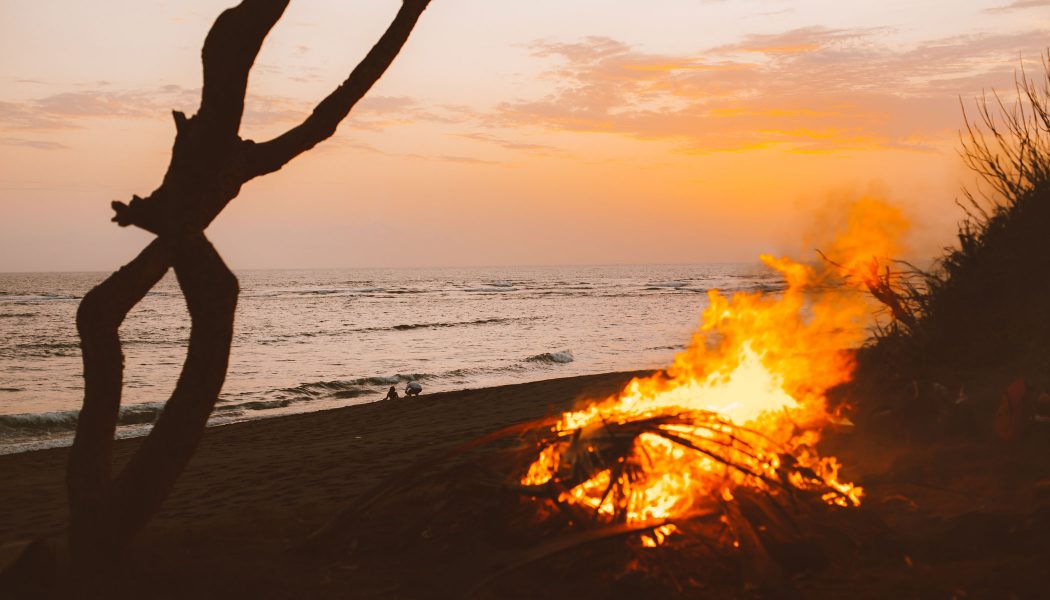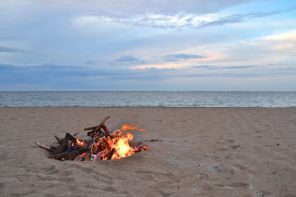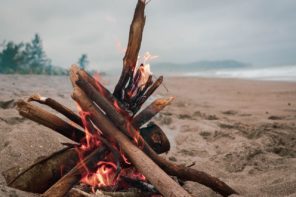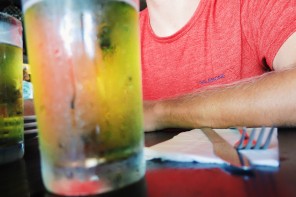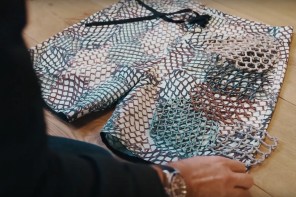Rachel DeCavage, founder of cinder + salt in conversation with Laura Rubin
Humans have been gathering around fires ever since the original tinder. There’s something special about communing around controlled combustion. It’s beautiful, dynamic, a little dangerous and deeply archetypal. Campfires also tend to inspire a more casual, present conversation than, say, Zoom.
So with that idea in mind, Whalebone contributing editor Laura Rubin is pulling up her camp chair to engage with a series of disruptive change-makers for good, those good people igniting the sparks, to talk about some stuff you probably won’t find on Google.
First up is Rachel DeCavage, the female founder of environmentally thoughtful apparel brand cinder + salt. Her story reminds us a little of Whalebone’s roots at a small screen-printing shop on Tuthill Road in Montauk. It all started with some ink.
cinder + salt specializes in screen-printed casual apparel, created at their zero-waste studio in Middletown, Connecticut. While the product range includes various tools for living lightly on the planet, cinder + salt’s specialty is their graphic T-shirts—sort of like concert tees if Mother Earth were headlining. And, cinder + salt walks the talk. Up to 50% of the based company’s profits are funneled directly back into a range of eco-initiatives.
We passed the flask with Rachel to get to know her and her business.
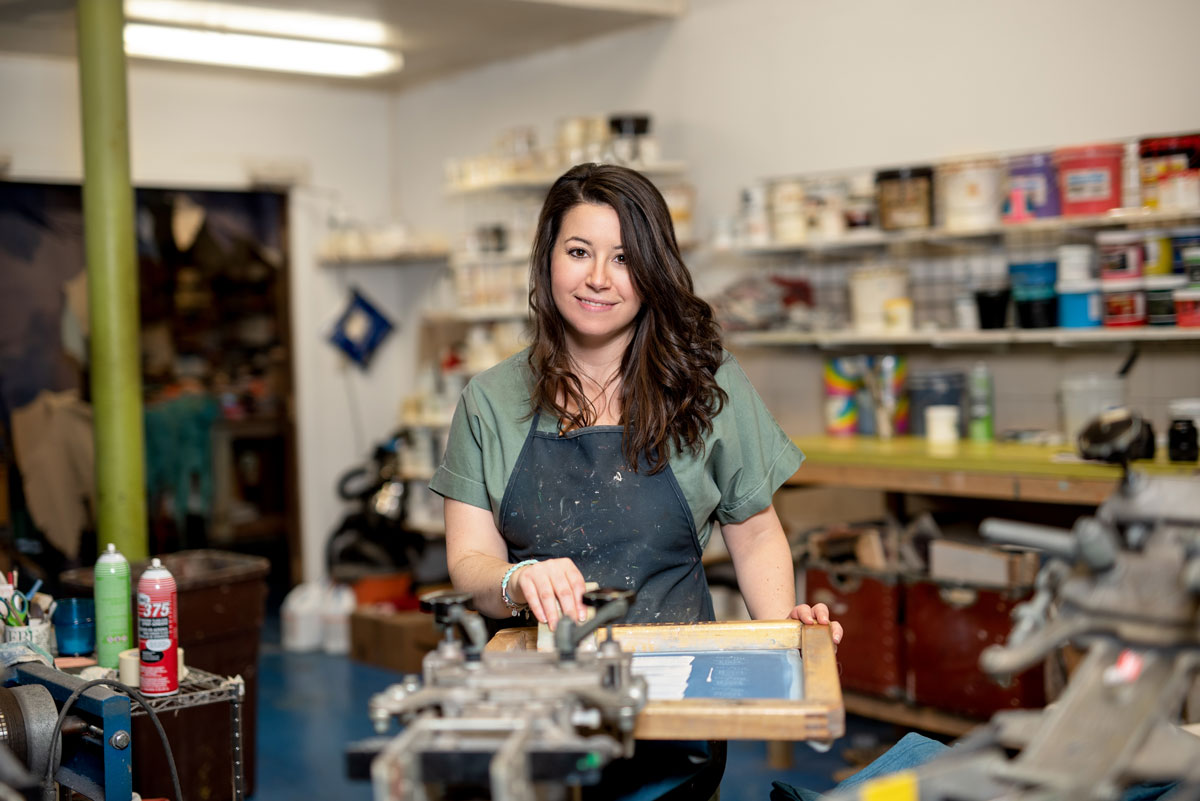
Laura: Happy Friday. It’s almost cocktail hour. I heard that your favorite adult beverage is a margarita. Confirm or deny.
Rachel: I am definitely a huge fan of turning on Cinco De Mayo radio and making a Cadillac margarita when I want to have fun. But as an after-work drink, it’s coconut seltzer with gin and an orange twist. In college I got into gin and tonics but then that became too sweet. So I switched to gin and soda, and then I just got hooked on coconut seltzer.
Laura: I’m impressed that you were sipping gin and tonics in college. Knocking back G&T’s instead of Jäger bombs or Natty Light. Very sophisticated.
Now that we have a visual of you sipping a cocktail, please tell us about cinder + salt. Starting a business is not an undertaking for lazy people. In general, I find entrepreneurs fall into two categories. What was the moment that you said, “Okay, I’m doing this.” Or was it a more organic process that you slid into and then realized, “Oh, alright. I think I have a business here.”
Inspired by the scent of campfire on your clothes and the taste of saltwater on your skin.
Rachel: I guess it’s a little bit of both. I grew up with a very entrepreneurial and artistic family. My Dad actually had a screen-printing business that he started the year that I was born. I never really wanted to get into screen printing. But by the time I got to college, I said, “Yeah, I’m definitely just always going to work for myself.” I knew I was never going to be someone’s employee.
I went to school for visual and fine arts at Bennington College where it’s a self-directed education, so there are no required classes. I basically just made art for four years straight. I didn’t really know what I wanted to do straight out of college, but I thought to myself, “Well, let me see if I can just make art and sell it and be a good champion for the planet at the same time.” And it took.
I worked for my Dad for a while, which was a great way for me to learn the ropes of running a small business. I did all the admin and bookkeeping. Then I started to make handmade fashion and furniture and home decor in this tiny little shop in town. I figured out that the most efficient use of my time and the most profitable products were screen-printed T-shirts. So that’s when I restructured and rebranded as “cinder + salt.”
I bought out my Dad’s printing equipment, so I’ve been working with the same equipment that I learned how to screenprint on, which is pretty cool. Once I built my own print shop, I was able to produce in a much more eco-friendly way and really keep the focus on the planet. So it kind of all just came together. There was just never a time in my life where I was willing to compromise what I was gonna do with my time every day. In a way, I always knew this would be where I would end up.

There was just never a time in my life where I was willing to compromise what I was gonna do with my time every day.
Laura: And where did that ethos come from? Being so clear that you were not going to compromise on how you spent your time every day?
Rachel: It probably comes from seeing my Dad run his own business, and a lot of other members of my family are artists. Everybody was trying to get their artwork into galleries and having these side hustles. Just being in my family and seeing what everybody was doing was an inspiration. I knew I was probably going to take a similar path, but I had to piece it all together to make it work. Aside from my Dad, nobody in the family was very business savvy. They were doing whatever they could to be able to make their art. I always knew there had to be another way where you could actually make a living being creative. I focused on that from when I was really young.
Laura: You took the paradigm that you grew up in—that if you’re creative and scrappy, you make it work—and you’ve been able to add in this additional layer of making it financially viable over a long period of time, creating growth. cinder + salt is currently in over 400 stores, which is no small feat. I often hear conscious business owners struggle with the “bigger = better” concept. We want to do more good, but the balance of growth with the commitment to our ideals is a tricky balance. What’s your vision of sustainable growth?
Rachel: When I was first starting out I wanted to be an anchor at the mall. I thought growth meant having more employees, having more stores and having more followers on Instagram. My goal was to have 10 free-standing cinder + salt stores. I always wanted to scale up, and I fell into the habit of comparing myself to other brands.
The more time, energy and money I put into growing that way, it became more evident that that was totally unsustainable because it always came down to me. I’m the designer, I’m making all the products. I’m trying to get everyone to understand the brand—even my own team. And it was just so, so draining. I decided this is not the sort of growth I wanted to have.
I realized there had to be a better way to do what I wanted to do—to have a louder voice without having a bigger footprint. Around 2017 I scaled back. We closed two of our three stores. I had to lay off a bunch of people, which was really difficult and devastating, but I just couldn’t keep putting in all this energy into becoming bigger. Instead, I focused all of our energy on how to become more eco-friendly. That’s when we decided to make our print shop zero-waste.
We started all these eco initiatives at our store, just stuff that I wanted to do. It doesn’t feel like work. It adds value to our mission and to what we’re putting out in the world without adding a ton of stress or costs. I think that’s really important when you think about growth. What can you accomplish with where you’re at now?
Laura: Let’s talk a little bit about the name. I am a beach bonfire enthusiast. I literally chose where I live for its proximity to one of the very few beaches in LA County where they’re allowed. So I’m particularly curious, where did the name cinder + salt come from?
Rachel: The name is inspired by the scent of campfire on your clothes and the taste of saltwater on your skin, the residue of a weekend well-spent. I wanted the brand name to evoke a feeling more than have it explain what we do. I spent a long time finding the right words to convey that nostalgic, familiar vibe of happy times spent outdoors. And that’s basically a feeling I want to have all day, every day.
Laura: You said your business ethos was inspired by “The Lorax” by Dr. Seuss was a big and early influence on you. What are some of the other books that have inspired you along the way and what are you reading now?

Rachel: “Small Giants: Companies That Choose to be Great Instead of Big” by Bo Burlingham has been a big influence. At the moment I’m reading “The Blue Zones” by Dan Buettner.
Laura: Two really good ones. You recently launched a responsible travel program in the middle of a pandemic. I appreciate that you recognized current constraints and continued to move forward with your vision anyway. That takes serious moxy.
Eco-tourism is a tough topic though, particularly in the age of Instagram. It’s a paradox: on one hand, we want to protect these beautiful places by bringing attention to them. But on the other hand, the more people that travel to them, the more potential to erode their delicate ecosystems. What’s your perspective?
Rachel: I love nature and I’m so amazed by the planet. I want to see these things with my own eyes, but I also want to make sure I’m doing it in a responsible way. That’s why I decided to host this trip and why we’re partnering with a local non-profit and volunteering when we get there. We have pretty low-key accommodations.
Laura: One of the places where we get eco-burnout is this idea that you have to do absolutely everything right. And the stakes are so high that it actually ends up causing people just to shut down.
Rachel: One of the things I try to do with cinder + salt is to meet people where they are and to not hold judgment. It’s really important to me to be like, “Listen, whatever you’re doing, it’s fine, but let’s work on maybe a better way.”
There’s definitely a degree of greenwashing with eco-tourism, but there are places that are truly, deeply invested in the planet. The reason I picked Costa Rica for our first trip is because the government has a very strong environmental ethos. There are many, many very strict laws about protecting the planet. For instance, if you buy a property, you have to have an inventory of your trees done because there are certain trees that you just cannot cut down, and so you have to build around the plants, which I absolutely love. I can’t wait to live in a really complicated and annoying place like Costa Rica because they’re protecting the planet.
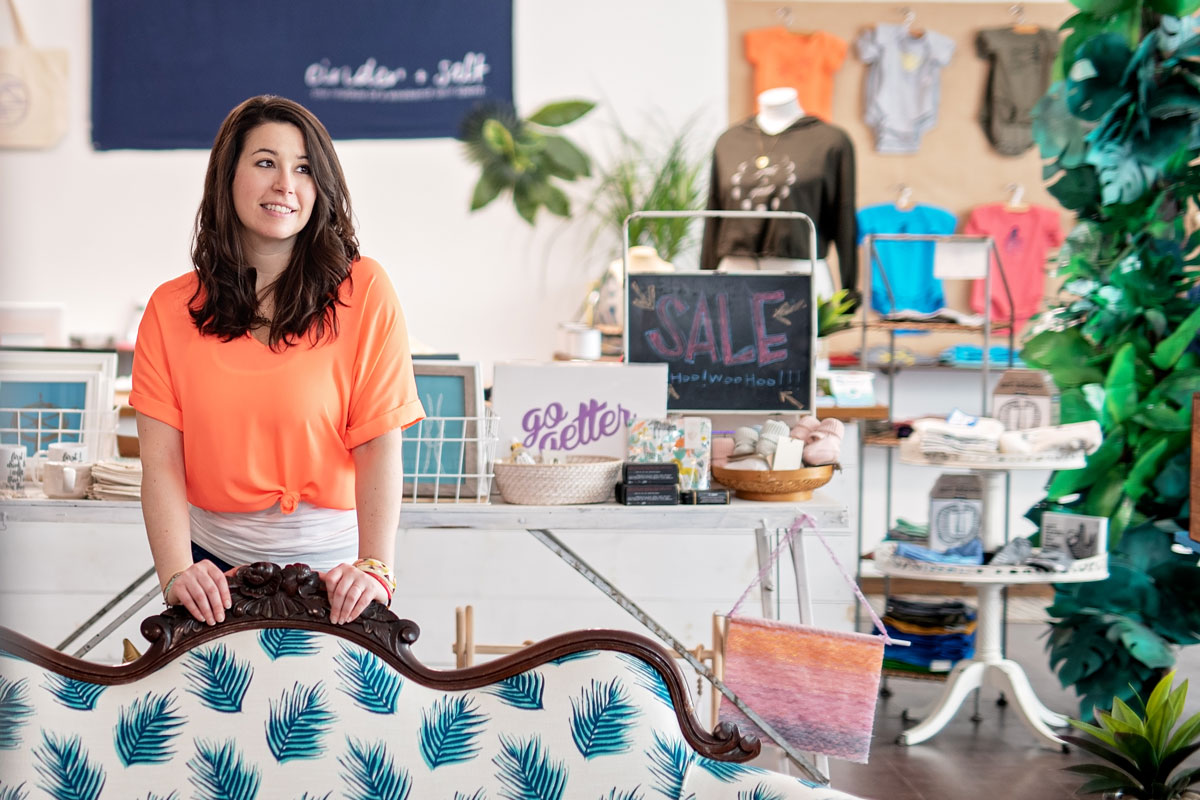
Laura: That’s a woman whose business model is “The Lorax.”
Rachel: So true. I don’t think it makes sense to be like, “Nobody can travel anymore. Sorry.” That would never work. But we can enlighten people about responsible travel and places in the world that are prioritizing the planet.
If you can change one person’s mind about the environment, maybe they’re a teacher and they’ll teach all of their kids that, or maybe they have a family and their children will grow up to be eco-warriors. You don’t really know what seed you’re planting with any of your initiatives. Of course we’re all humans, and just existing on this planet is bad for the planet. But you know, what can you do? We can’t all just kill ourselves. We have to exist here in harmony with everything and you just have to keep working at it.
Laura: Bringing that lens of intent—do better if not best—is something I’ve been hearing a lot lately in environmental circles. It feels more approachable. And as a result, it’s creating a bigger, more inviting tent for more people.
Rachel: Right. Sometimes I’m like, “Wow, other people are so much better at protecting the planet than I am.” That’s what Instagram will do to you. But then I think, “Well, how many billions of people don’t do anything for the planet?” So if I can just shift the mindset of some people, whoever follows us, maybe they can do a little bit better today.
Laura: I am privileged to witness a lot of vulnerability in my work with AllSwell Creative. I hear a ton about this dynamic of comparison and how it’s fueled by social media. But it usually tends to be, “Oh my gosh, his life looks perfect” or “She’s got a better body” or whatever. And it’s pretty fascinating this dynamic presents for you as, “That person’s a better environmentalist than I am.” Goes to show that anything can be fodder for negative comparison.
Focusing on some of your wins, what have some of the milestones been as a small business owner? As women, often we don’t give ourselves the chance to reflect on our accomplishments, to take that victory lap. What are a couple of those moments where you felt, “Alright, Rachel. We’re doing good.”
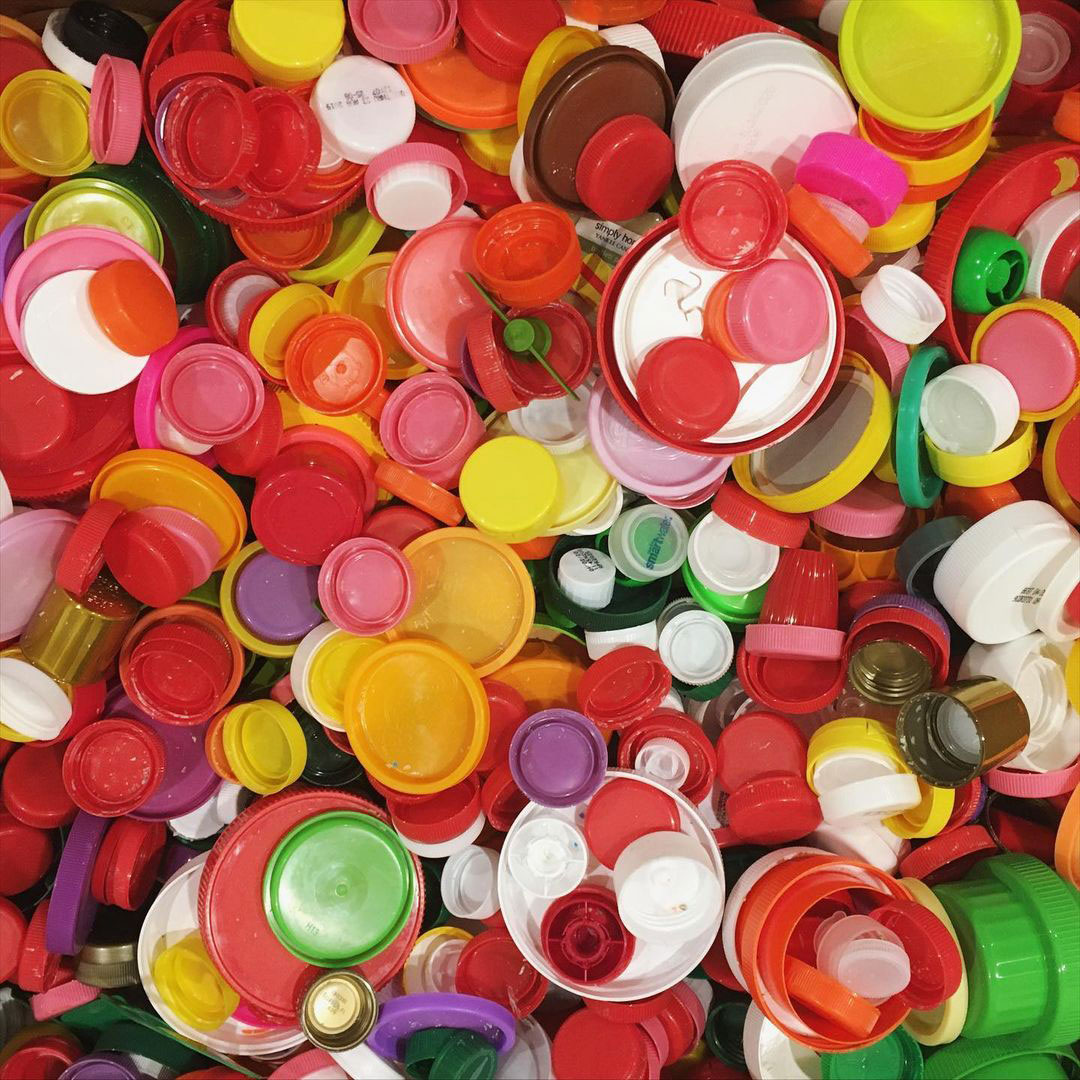
Rachel: One of them was when we officially hit the 100 store mark two summers ago, wholesaling to 100 stores. That felt huge. We all went out for Mexican that night and had margaritas. Then I was like, “All right, let’s celebrate again at 500.” And at the time my team said “500?! Oh my god.” But now we’re almost there. So that’ll be exciting.
The other was hosting our first beach cleanup. We are in Middletown, Connecticut, about a 45-minute drive to the Long Island Sound. So it’s not the real ocean. And part of me was thinking, “What business do we have hosting a beach cleanup?” But it just felt like the thing that we should do at cinder + salt. I had such hangups about it. I didn’t know how to do it. I didn’t know anything. So I just made some phone calls. I just put some stuff together and hosted a beach cleanup.
And it was the most exciting thing. I just thought it was the best, one of the highlights of my career. And now I do them all the time. But I remember the first time I did it, it felt like a really big hurdle. I realized people have much bigger hurdles than this in their careers and in their life. But at the time I didn’t know how I was going to make it happen. And when I finally did it, it was very exciting for me.
Laura: You were basically having beach cleanup imposter syndrome, and you were able to get past that and actually do the thing that you could and should be doing for your business and the planet. I will toast a gin cocktail to that.


